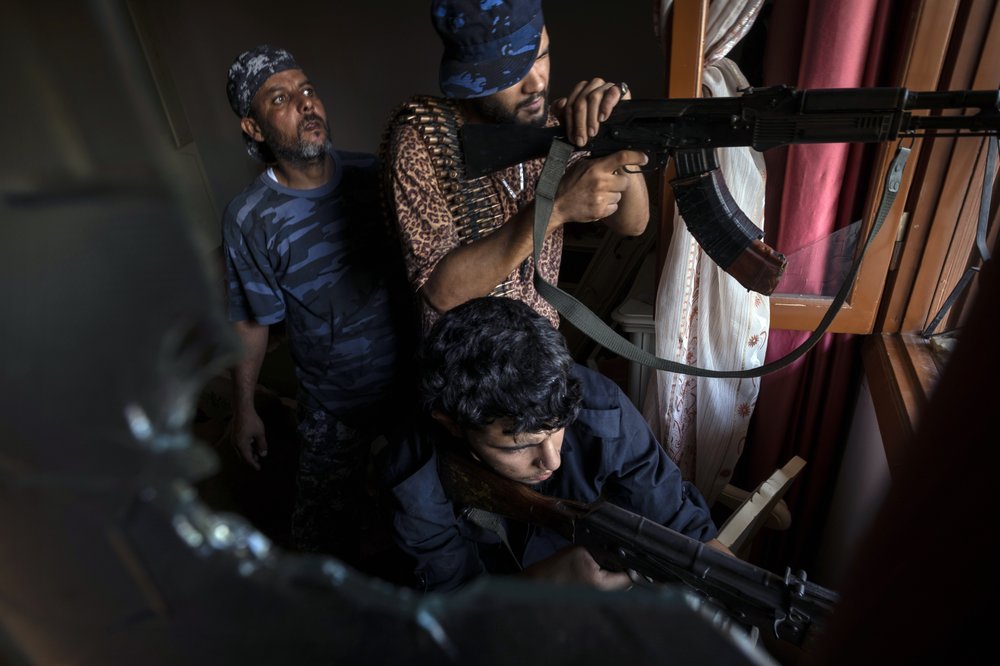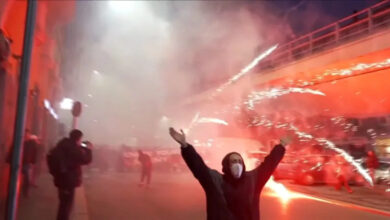
ROME (AP) — Authorities in northern Italy arrested the captain of a Lebanese-flagged cargo ship on suspicion of international arms trafficking Wednesday while they investigate if the vessel transported tanks, rockets and other weapons from Turkey to Libya.
The captain is under investigation for allegedly transferring military goods to Libya with as-yet unidentified Turkish military officials in violation of a United Nations arms embargo, Italian prosecutor Franceso Pinto told The Associated Press.
Italian authorities launched their probe based on allegations a crew member made after the cargo ship arrived in the port city of Genoa earlier this month.
The cargo ship, the Bana, turned up on the radar of French authorities not long before it reached Genoa on Feb. 2. The French aircraft carrier Charles de Gaulle shadowed the vessel in late January.
The Lebanese crew member who blew the whistle in Italy alleged that tanks and other vehicles that could be used for military purposes were loaded onto the Bana at a Turkish port and then transported to Tripoli, the Libyan capital.
The sailor, who told Italian border police he was seeking political asylum, said the Bana allegedly sailed without cargo from Libya to Genoa. The 40-year–old ship’s hold is designed to carry vehicles.
According to a report in Genoa daily newspaper Il Secolo XIX, the asylum-seeking sailor alleged that some 10 Turkish agents, including military officials, traveled on the cargo ship from Mersin, Turkey, to Tripoli, staying in the hold near armored vehicles.
Pinto told the AP the sailor provided photographs showing vehicles in the ship’s hold and that his application for political asylum in Italy is under consideration.
“He contends he discovered this trafficking” of arms, the prosecutor said.
If true, the alleged actions would violate the U.N. embargo aimed in part at ending nine years of fighting between rival factions seeking to control energy-rich Libya.
Its not just the sailor’s allegations that aroused suspicions about the cargo ship.
Earlier in the week, a French military official, speaking anonymously due to the sensitivity of the issue, said the Charles de Gaulle aircraft carrier on Jan. 29 spotted a Turkish frigate off the Libyan coast escorting the Bana, which made a stop in Tripoli’s port.
French fighter jets from the aircraft carrier spotted a delivery while on a reconnaissance mission, French newspaper Le Monde reported.
The Charles de Gaulle was in the area as part of a U.S.-led operation against the Islamic State group.
Pinto told the AP the Bana’s transponders were turned off after it left the Turkish port and crossed the water to Libya. Investigators in Italy hope that analyzing equipment from the ship, including the cellphones of crew members, would help verify the Bana’s route.
Italy, in an effort to regain influence as a geopolitical player in Libya, has campaigned for vigorous monitoring and enforcement of the international arms embargo imposed on its former colony in northern Africa. The Italian government has not made any public statements about the Bana investigation.
Rival forces control different parts of Libya. The U.N.-recognized government of Prime Minister Fayez Sarraj is based in the west and seated in Tripoli. Forces based in the east and led by a powerful general, Khalifa Hifter, have been engaged in an offensive to take Tripoli for nearly a year.
Both of the rival Libyan governments have enjoyed diplomatic and other forms of support from a host of countries. France, for example, a rival of Italy’s in pursuing energy interests in oil-and-natural-gas rich Libya, sided with Hifter for a long time.
The Turkish government recently ratcheted up its backing of Sarraj’s government, promising military support and sending to Libya hundreds of Syrian fighters. The Syrians included militants affiliated with al-Qaida and the Islamic State group
Turkish President Recep Tayyip Erdogan said Wednesday that Turkey would continue aiding Sarraj’s government to “establish dominance” over all of Libya.
Neither Turkey’s Foreign Ministry nor the country’s military responded to requests for comment on the whistle-blower’s allegations or the Italian investigation.
In an interview with the AP last week, Turkish Defense Minister Hulusi Akar said his country was doing all it could to ensure an agreement on respecting the arms embargo is put into practice. The deal was reached last month at a Berlin conference on Libya.
A spokesman for Serraj’s office didn’t reply to phone calls and text messages from the AP on Wednesday seeking comment about the Bana investigation.
The cargo ship’s Lebanese owner, Merhi Abou Merhi, denied media reports in recent weeks that the Bana was used to transport armored vehicles to Libya. He said the vessel usually takes cars between Lebanon and Libya.
He has not hasn’t responded to an AP request for an interview. There was no immediate comment from Lebanese authorities in Beirut.
The United States accused Abou Mehri in 2015 of laundering money for the militant group Hezbollah, but removed him from its list of sanctioned individuals in 2017. He consistently denied the money-laundering allegations.
The Bana remains idled in Genoa’s port, where it was supposed to take on a cargo of cars from European Union countries that were to be delivered to Misrata, Libya, prosecutor Pinto said.
Pinto said the whistle-blower sailor was on his first voyage on the Bana but told authorities that other crew members recounted the cargo ship bringing arms to Tobruk, a city in eastern Libya, on a previous trip.
Italian investigators plan to question the crew further. They are also awaiting results from technical analyses of ship equipment before deciding how to proceed.
Reporting by Frances D’Emilio in Rome, Suzan Fraser in Ankara, Turkey, Bassem Mroue in Beirut, Lebanon, Sam Magdy in Cairo, Aritz Parra in Madrid and Sylvie Corbet in Paris.
Image: In this Aug 31, 2019 file photo, fighters of the ‘Shelba’ unit, a militia allied with the U.N.-supported Libyan government, aim at enemy positions at the Salah-addin neighborhood front line in Tripoli, Libya (AP Photo/Ricard Garcia Vilanova, File)



